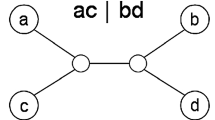Abstract
Evolution is an important sub-area of study in biological science, where given a set of taxa, the goal is to reconstruct their evolutionary history, or phylogeny. One very recent approach is to predict a local phylogeny for every subset of 4 taxa, called a quartet topology, and then to assemble a phylogeny for the whole set of taxa satisfying these predicted quartet topologies. In general, the predicted quartet topologies might not always agree with each other, and thus the objective function becomes to satisfy a maximum number of them. This is the well known Maximum Quartet Consistency (MQC) problem. In the past, the MQC problem has been solved by dynamic programming and the so-called fixed-parameter method. Recently, we have proposed to solve the MQC in answer set programming. In this note, we summarize the theoretical results of this approach and report new experimental results for the purpose of comparison, which show that our approach in answer set programming is favored over the existing approaches based on dynamic programming and fixed-parameter method. In particular, some of the hard instances (where the error ratio is high) that were not reported to be solved in other approaches can now be solved in our approach.
Preview
Unable to display preview. Download preview PDF.
Similar content being viewed by others
References
Ben-Dor, A., Chor, B., Graur, D., Ophir, R., Pelleg, D.: From four-taxon trees to phylogenies: the case of mammalian evolution. In: Proceedings of the Fourth Annual International Computing and Combinatorics Conference (RECOMB), pp. 9–19 (1998)
Berry, V., Jiang, T., Kearney, P.E., Li, M., Wareham, H.T.: Quartet cleaning: Improved algorithms and simulations. In: Nešetřil, J. (ed.) ESA 1999. LNCS, vol. 1643, pp. 313–324. Springer, Heidelberg (1999)
Gramm, J., Niedermeier, R.: A fixed-parameter algorithm for minimum quartet inconsistency. Journal of Computer and System Science 67, 723–741 (2003)
Simons, P.: Smodels: an implementation of the stable model semantics for logic programs, Accessible through http://www.tcs.hut.fi/Software/smodels/
Wu, G., Lin, G.-H., You, J.: Quartet based phylogeny reconstruction with answer set programming. In: Proceedings of The 16th IEEE International Conference on Tools with Artificial Intelligence (ICTAI 2004), pp. 612–619 (2004)
Author information
Authors and Affiliations
Editor information
Editors and Affiliations
Rights and permissions
Copyright information
© 2005 Springer-Verlag Berlin Heidelberg
About this paper
Cite this paper
Wu, G., You, JH., Lin, G. (2005). Application of Smodels in Quartet Based Phylogeny Construction. In: Baral, C., Greco, G., Leone, N., Terracina, G. (eds) Logic Programming and Nonmonotonic Reasoning. LPNMR 2005. Lecture Notes in Computer Science(), vol 3662. Springer, Berlin, Heidelberg. https://doi.org/10.1007/11546207_29
Download citation
DOI: https://doi.org/10.1007/11546207_29
Publisher Name: Springer, Berlin, Heidelberg
Print ISBN: 978-3-540-28538-0
Online ISBN: 978-3-540-31827-9
eBook Packages: Computer ScienceComputer Science (R0)




